HighFleet is an action-strategy game that's like nothing I've ever played before
Expect lethal arcade battles, roleplaying, diplomacy, a survival campaign, and it's a looker too.
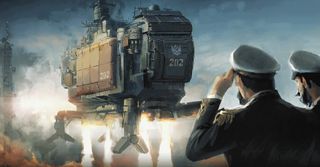
HighFleet kicked the absolute crap out of me. If aerial physics is involved, I seem to have an almost pathological need to crash and explode. And there's a lot of dizzying sky brawls in HighFleet. It demands some fast fingers when you're controlling your ships in its brisk arcade battles, but before that comes tonnes of preparation, strategy, and even a spot of diplomacy. It's an unusual cocktail of systems and genres that collide to create something quite surprising.
Its closest relative is probably FTL. HighFleet puts you in command of a ship on a dangerous mission, undertaken across a large map dotted with cities that can be traded with, refueled at, or contain new people that you can chat to and maybe recruit. There's even an analogue of FTL's invincible rebel fleet nipping at your heels, which constantly forced you to keep moving forwards; this time, though, it's a whole bunch of roaming strike teams packing nukes, and avoiding them is even trickier.
Dig a little deeper, however, and HighFleet starts to look very different. For one, you're not controlling a single ship. You've got your beefy flagship, but it also carries your arsenal of highly customisable bombers, frigrates, scouts and other craft. They're what you'll send into battle, though you can still bring your flagship into a scrap if you're OK with risking obliteration.
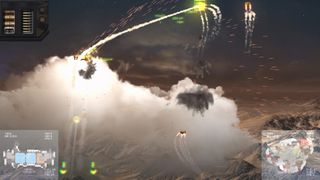
Fights are real-time arcade affairs with friendly fire, physics and lots of explosions. Even with HighFleet's strategy sensibilities, however, the fights are surprisingly straightforward, so you can just worry about getting your enemy in your sights and getting the hell out of the way of their bullets. Timing and precision are key. I have neither in abundance, lamentably. Even your lightest ship is a steel behemoth that really wants to fall to the earth, and while staying airborne isn't difficult—unless your engines have been destroyed, which will definitely happen—it does feel like you're always pushing against gravity, and every slick aerobatic manoeuvre takes its toll. I don't need anyone to tell me my engines are overheating, because they're always overheating.
There are a few other things you'll need to keep an eye on, too, like the time it takes to reload your weapons, your missile count, specific modules being taken out and, my nemesis, fire. So much fire. These ships might be tough, but they don't have any fancy sci-fi shields and can't just shrug off direct hits. Lose your fuel, your engines or your weapons and you might as well retreat, if you can, and bring in the next ship. You can only command one at a time, and you have to set up their order before the battle, but you can also see the enemy lineup at the same time and plan accordingly. They're essentially tag-team brawls.
Before a battle, you can choose to commit a smaller portion of your forces to a surprise attack, the effectiveness of which you'll be shown before you leap in. That might lead to you being able to hit the enemy while they're sleeping, using your sneaky vessels to drop bombs on them before they take off. That's still a risk, though, because you still have to worry about their guns, and the ground defenses. There's nothing more embarrassing than chuckling away as you sidle up to a grounded ship before a barrage of missiles strike you right on your weak spot. I speak from plenty of experience.
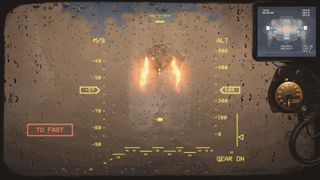
OK, so maybe it's not entirely straightforward. But in the heat of battle if feels like everything else melts away, leaving just the arcade essentials. What the other systems and complications do is give you a sense of constant danger, where you're dancing on a knife edge at all times. You're only ever a few hits away from disaster, so you bob and weave between streams of enemy gunfire, with judicious use of your boost to make quick adjustments and get out of the way, pushing your engine to its breaking point.
The biggest gaming news, reviews and hardware deals
Keep up to date with the most important stories and the best deals, as picked by the PC Gamer team.
It's hard to appreciate when you're trying to put out yet another fire, but the battles are a striking bunch, especially if you like skies filled with smoke, debris and projectiles. The ships look more fetching up close, of course, and you get a much better look at them when you land in a city. This is a manual process that sees your chosen ship plummeting towards the ground, requiring you to slow down the descent and pick a landing spot, a choice which will determine your repair bonus. HighFleet is a very tactile game that does very little without your direct, hands-on input, but there are times that I wish it would just take over for me, and it's usually when I'm landing. It takes just long enough and is just fiddly enough to become a chore, and the visual payoff isn't quite enough to make up for the busywork.
The real eye candy comes from the diegetic UI. Aside from the main menu, nearly every UI element is part of your command station, so when you want to drop your ships into a city, for instance, you have to yank a lever, and you can use your compass, ruler, pencil and eraser to chart your course on the map display. It's a bit imposing, but it also begs to be played with, and this is one place where the tactile nature of the game really works to its advantage. It simply feels great. The sound effects then elevate the fantasy of being in command of this fleet of steel titans. There's just something deeply satisfying about hearing gears grinding and mechanical components clicking away as you watch ammo being reloaded.
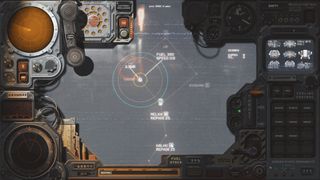
Crushing your enemies is only half the battle, and you're just as likely to be undone by your dwindling fuel supply as you are a missile. HighFleet's campaign has a strong survival bent that sees you living hand to mouth as you try to find the resources required for your conquest of the Kingdom of Gerat. Fuel gets burned through at an alarming rate, but you can also acquire more even if you don't have cash by taking enemy supply vessels and investigating crashes. You don't want to spend all of your cash on fuel because you'll also need it to upgrade your ships with various components and weapons, or more likely spend it on repairs.
Being in charge of this war machine also means being a people person. Diplomacy and relationships play an unusually large role, and saying the right thing can net you new friends, crew and ships, or you can just piss people off and ruin everyone's morale. Sometimes you'll have to negotiate, playing cards that let you broach certain topics, make speeches and dole out gifts, and as you chat you'll learn more about the person on the other side of the table, allowing you to tailor your conversation to their proclivities. If they have a bee in their bonnet about the Romani Empire, to which you belong, talking about how glorious it is will not impress them, but you might not know this until you've already made the blunder. Something to remember for next time. Even regular conversations give you a taste of this, so even when you're not playing cards, you'll need to be careful about what you say.
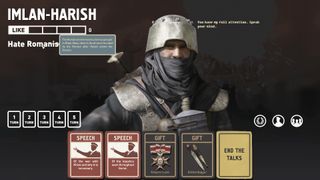
The system gives HighFleet some roleplaying vibes, but it still feels like an extremely good fit for a strategy game—ultimately these chats are little tactical battles where you outmanoeuvre your opponent with words. The English script is still being worked on, but aside from the occasional typo the translation seems fine, though the writing is a little stiff. There's also a lot to take in, with empires, kingdoms, factions and lots of culture-specific traits that you have to learn about on the job, which means juggling a lot of knowledge in a short space of time. You're dropped into this conflict between the Romani Empire and Gerat in medias res, so it does feel like there's a heck of a lot of catching up to do. Thankfully, hovering over key nouns will bring up a brief description that helps make sense of things.
On paper, HighFleet contains so many systems that I'm already sold on, so it's reassuring to see that they all play nicely together. The rate at which it throws new things at you—at least during the first few hours that I played—and extremely thin tutorials make it less accessible than it could be, but it's still very promising.
You'll be able to check out HighFleet for yourself when it arrives later this year.

Fraser is the UK online editor and has actually met The Internet in person. With over a decade of experience, he's been around the block a few times, serving as a freelancer, news editor and prolific reviewer. Strategy games have been a 30-year-long obsession, from tiny RTSs to sprawling political sims, and he never turns down the chance to rave about Total War or Crusader Kings. He's also been known to set up shop in the latest MMO and likes to wind down with an endlessly deep, systemic RPG. These days, when he's not editing, he can usually be found writing features that are 1,000 words too long or talking about his dog.
Most Popular


